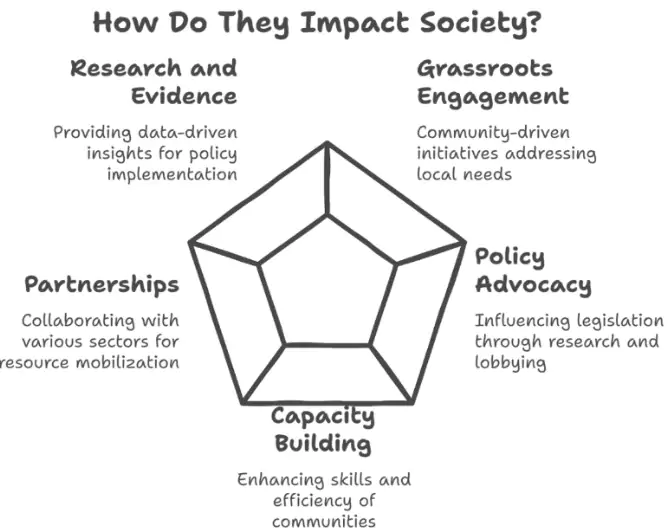While addressing the “JITEM Youth Conclave 2025”, the Look Sabha Speaker emphasized the role of social organizations in the holistic development of society and the nation as extremely important.
- The conclave was organized by Jain International Trade Organisation (JITO)
About Social Organisations
- Social organisations are non-state, non-profit entities such as NGOs, civil society organisations (CSOs), community-based organisations (CBOs), religious institutions, philanthropic bodies, trade unions, and informal local collectives working for social welfare.
- Operate independently of the state, but often complement government efforts.
Key Roles of Social Organisations
- Policy Advocacy and Influence: Advocate for marginalized groups, influence policy decisions, and bring grassroots issues to the forefront.
- Right to Information (RTI) Act, 2005: Mazdoor Kisan Shakti Sangathan (MKSS) led the movement, enhancing transparency in governance.
 Rights of Persons with Disabilities Act, 2016: Advocacy by National Centre for Promotion of Employment for Disabled People (NCPEDP) drove its implementation.
Rights of Persons with Disabilities Act, 2016: Advocacy by National Centre for Promotion of Employment for Disabled People (NCPEDP) drove its implementation.
- Social Service Delivery: Fill gaps in public services, especially in underserved areas, by providing healthcare, education, sanitation, and disaster relief.
- Goonj (NGO): Provided relief during COVID-19, addressing basic needs like clothing and food for vulnerable communities.
- Governance and Accountability: Act as watchdogs, monitoring government programs, conducting social audits, and exposing corruption.
- ADR: Monitors electoral processes, promoting transparency in political funding.
- MKSS: Pioneered participatory social audits in Rajasthan, ensuring accountability in welfare schemes.
- Community Mobilization and Empowerment: Mobilize communities, raise awareness about rights, and build local leadership.
- Self-Employed Women’s Association (SEWA): Organizes 2.9 million informal sector women workers across 18 states, advocating for their rights and economic empowerment.
- Vijaya Foundation: Focuses on protecting children’s rights through community-driven initiatives.
- Innovation and Social Entrepreneurship: Develop innovative solutions to social problems, pilot scalable models, and promote sustainable development.
- Akshaya Patra: Revolutionized mid-day meal programs through centralized kitchens.
- Environmental Conservation and Climate Action: Address environmental challenges, promote sustainable practices, and influence climate policies.
- Centre for Science and Environment (CSE): Shaped India’s climate policy through research, contributing to stricter vehicle emission norms and renewable energy promotion.
- Digital Rights and Cybersecurity: Protect digital rights, promote cybersecurity, and ensure equitable access to technology.
- Internet Freedom Foundation (IFF): Advocates against Aadhaar-based surveillance, promoting data privacy and net neutrality.
- Civic Engagement and Participatory Democracy: Promote active citizenship, encourage participation in governance, and deepen democracy.
- PRS Legislative Research: Enhances public understanding of legislative processes.
- MKSS: Encourages participatory governance through social audits.
Significance of Social Organisations
- Filling State Capacity Gaps: Social organisations act where state presence is weak, especially in health, education, disaster relief, and tribal outreach.
- Empowering the Marginalised: Social organisations offer voice and representation to women, Dalits, Adivasis, urban poor, elderly, and persons with disabilities.
- Kudumbashree in Kerala—empowered over 4.5 million women through SHGs and microenterprises, contributing to Kerala’s high Human Development Index.
- Facilitating Participatory Development: NGOs act as intermediaries between state and society, facilitating deliberation, dialogue, and consent-based development.
- Innovation and Knowledge Diffusion: Social organisations pioneer innovative, scalable models to address social issues, often serving as testing grounds for government policies.
- Organisations often pilot new models in health (e.g., community-based care), education (e.g., ASER survey), or climate (e.g., water harvesting).
- Barefoot College in Rajasthan trained rural women, including illiterate grandmothers from Africa, to become solar engineers.
- Strengthening Democratic Governance: NGOs, CBOs, and rights-based organisations act as watchdogs, ensuring transparency, accountability, and inclusion.
- They are central to the growth of rights-based laws (RTI Act, Forest Rights Act) and PIL activism in India.
Ethical Relevance of Social Organisations
- Manifestation of Dharma and Social Duty: Social service is seen as Dharma—an individual’s moral responsibility to serve others, irrespective of caste, religion, or recognition.
- Example: Gandhiji’s idea of “Sarvodaya through Antyodaya” stressed service to the weakest as a moral imperative, not just a political goal.
- Gandhian Ethics and Trusteeship
- Trusteeship Model: Wealthy individuals and organisations must act as trustees, using resources for public good rather than personal gain.
- Ethical restraint, simplicity, and decentralised welfare are core principles.
- Example: JITO’s charitable activities, including scholarships, clean energy projects, and community kitchens, reflect ethical trusteeship rooted in Jain and Gandhian principles.
- Promotion of Ethical Values: Ahimsa, Compassion, Renunciation
- Many social organisations are rooted in religious and spiritual traditions that value non-violence (Ahimsa), selfless service (Seva), and renunciation (Tyag).
- Example: Ramakrishna Mission promotes holistic education and relief work based on Vedantic ethics of unity and compassion.
- Collective Morality and Social Conscience: Non-State Actors strengthen collective ethical responsibility by involving communities in decisions.
- Help cultivate shared moral reasoning, as seen in community-led public hearings (Jan Sunwai) or social audits.
- Ethics of Inclusion and Equity: Promote ethical development based on equity, justice, and voice.
- Voluntarism and Selfless Action (Nishkama Karma): Volunteers work without expectation of return (akin to Nishkama Karma from Bhagavad Gita).
- Motivation is internal moral duty, not external reward.
Challenges Faced by Social Organisations in India
- Regulatory and Legal Hurdles: Complex registration procedures under Societies Registration Act, FCRA, or Trusts Act.
- Tightened restrictions under the FCRA Amendment Act 2020—NGOs face restrictions on receiving foreign funds and sub-granting.
- Amnesty International shut its India operations in 2020 citing FCRA license suspension. As of 2023, over 6,600 NGOs lost FCRA registration.
- Resource Constraints and Funding Dependence: Reliance on foreign aid, donor funding, or CSR (Corporate Social Responsibility) makes long-term planning difficult.
- Core costs (staff salaries, training) often go unfunded.
- Many grassroots NGOs in India operate with budgets under ₹10 lakh/year and struggle to retain skilled staff.
- Lack of Institutional Capacity: Poor documentation, low-tech adoption, and weak monitoring limit scalability and credibility.
- Fragmented leadership and absence of second-rung leadership reduces sustainability.
- In tribal and rural India, many NGOs lack skilled personnel to manage digital records, e-governance tools, or impact evaluations.
- Fragmentation and Duplication: Thousands of small organisations operate without coordination, leading to overlap in services and wastage of effort.
- Absence of collective platforms limits voice and scale.
- Accountability and Trust Deficit: Accusations of corruption, fund mismanagement, or foreign influence erode public trust.
- Lack of mandatory social audits, performance metrics, or ethical guidelines.
- Allegations of fund misuse in high-profile NGOs during the Anna Hazare movement triggered demands for regulatory scrutiny.
- Urban Bias and Exclusion: NGOs are mostly concentrated in urban areas and elite-run, creating disconnect with rural/tribal realities.
- Exclusion of marginalised voices from leadership roles in the sector.
- Fewer Dalit or Adivasi-led NGOs receive visibility or funding despite representing vulnerable communities.
- Digital and Technological Backwardness: Many grassroots organisations lack digital tools for outreach, fundraising, or data reporting.
- During COVID-19, tech-savvy NGOs mobilised relief faster (e.g., GiveIndia, Ketto), while traditional groups struggled to adapt to online systems.
Successful Examples of Social Organisations
- Empowering Women Through Microfinance: Grameen Bank (Bangladesh)
- Founded by Dr. Muhammad Yunus, Grameen Bank has revolutionised micro-lending by offering small loans to the poor, particularly women, in rural Bangladesh.
- Over 10 million people served, mainly women, empowering them to start small businesses and become economically self-sufficient.
- Disaster Relief and Emergency Response: Médecins Sans Frontières (MSF)
- Médecins Sans Frontières (Doctors Without Borders) is renowned for its emergency medical care during conflicts, epidemics, and natural disasters.
- They work in countries like Syria, South Sudan, and Ebola-affected regions to provide life-saving medical treatment, including surgical care and epidemic control.
- Sustainable Development and Clean Energy: Barefoot College (India)
- Barefoot College in Rajasthan has trained women (including illiterate grandmothers) from Africa, Asia, and Latin America to become solar engineers in their communities.
- This innovative model promotes sustainable energy and empowers women in rural communities.
- Environmental Advocacy and Climate Policy: Centre for Science and Environment (CSE) (India)
- CSE has been instrumental in shaping India’s climate policies, contributing to the implementation of vehicle emission standards and renewable energy initiatives.
- Through research, data-driven advocacy, and public campaigns, CSE has pushed for environmental reforms in industries, agriculture, and energy.
- Rights Advocacy and Legislative Change: Human Rights Watch (HRW)
- HRW monitors and campaigns for human rights globally, investigating atrocities, civil rights violations, and discriminatory policies.
- Their reports influence international policy and UN resolutions, often holding governments accountable for human rights abuses.
- Digital Rights and Cybersecurity: Internet Freedom Foundation (IFF) (India)
- IFF works to protect digital rights, focusing on privacy, cybersecurity, and net neutrality.
- They advocate against Aadhaar-based surveillance, focusing on data protection, and ensuring equitable access to digital platforms for all citizens.
- Youth Empowerment and Education: Ashoka
- Ashoka identifies and supports social entrepreneurs who are developing innovative solutions to global issues like education, health, environment, and poverty.
- Access to Healthcare and Education: Akshaya Patra (India)
- Akshaya Patra operates centralized kitchens, providing mid-day meals to over 2 million children across 15 states in India, improving school attendance and nutrition.
- World Food Programme (WFP) draws inspiration from Akshaya Patra‘s success in integrating nutrition with education for holistic child development, especially in underprivileged areas.
- Fostering Democracy and Governance: Association for Democratic Reforms (ADR) (India)
- ADR has advocated for transparency in political funding, leading to Supreme Court rulings in India on the electoral bonds scheme and pushing for electoral reforms in India.
Way Forward for Social Organisations
- Reforming Regulatory Frameworks for Greater Flexibility: Streamline procedures under FCRA, Societies Registration Act, and other regulations to make it easier for genuine social organisations to function.
- Implement uniform compliance norms across states, allowing NGOs to work without excessive bureaucratic obstacles.
- Strengthening Public-Private Partnerships: Promote cooperation over confrontation—build partnerships between the state and social organisations for resource mobilization and scalable solutions.
- Create funding mechanisms that pool resources from CSR, philanthropy, and government to enhance NGOs’ operational capacity.
- Capacity Building and Digital Transformation: Invest in capacity building at the grassroots level, focusing on leadership training, digital tools, and impact measurement.
- Enable NGOs to adopt technology for outreach, monitoring, and data reporting, ensuring digital literacy even in rural areas.
- Promoting Transparency and Accountability: Encourage NGOs to conduct social audits, ensuring transparency and accountability in financial reporting and project outcomes.
- Develop standardised systems for NGOs to track their impact and communicate results effectively to stakeholders.
- Encouraging Collaboration and Networking Among NGOs: Facilitate platforms for collaboration among diverse social organisations to share knowledge, resources, and best practices.
- Build national and regional networks that amplify the voice of smaller organisations and coordinate efforts to reduce redundancy.
- Fostering Inclusivity and Representation of Marginalised Groups: Ensure that Dalit, Adivasi, women, and other marginalised groups lead social organisations and decision-making processes.
- Encourage leadership diversity within social organisations to ensure the representation of socially excluded communities.
- Building Sustainable and Long-Term Models: Shift from donor-dependence to sustainable models that include local fundraising, social enterprises, and community-based resources.
- Provide NGOs with the tools to diversify revenue streams and reduce over-reliance on external funding.
Conclusion
Social organisations are pivotal in driving holistic development by addressing service gaps, empowering marginalized groups, and fostering ethical governance. By overcoming challenges through regulatory reforms, digital transformation, and collaboration, they can amplify their contribution to achieving Viksit Bharat 2047.
![]() 19 Jul 2025
19 Jul 2025

 Rights of Persons with Disabilities Act, 2016: Advocacy by National Centre for Promotion of Employment for Disabled People (NCPEDP) drove its implementation.
Rights of Persons with Disabilities Act, 2016: Advocacy by National Centre for Promotion of Employment for Disabled People (NCPEDP) drove its implementation.